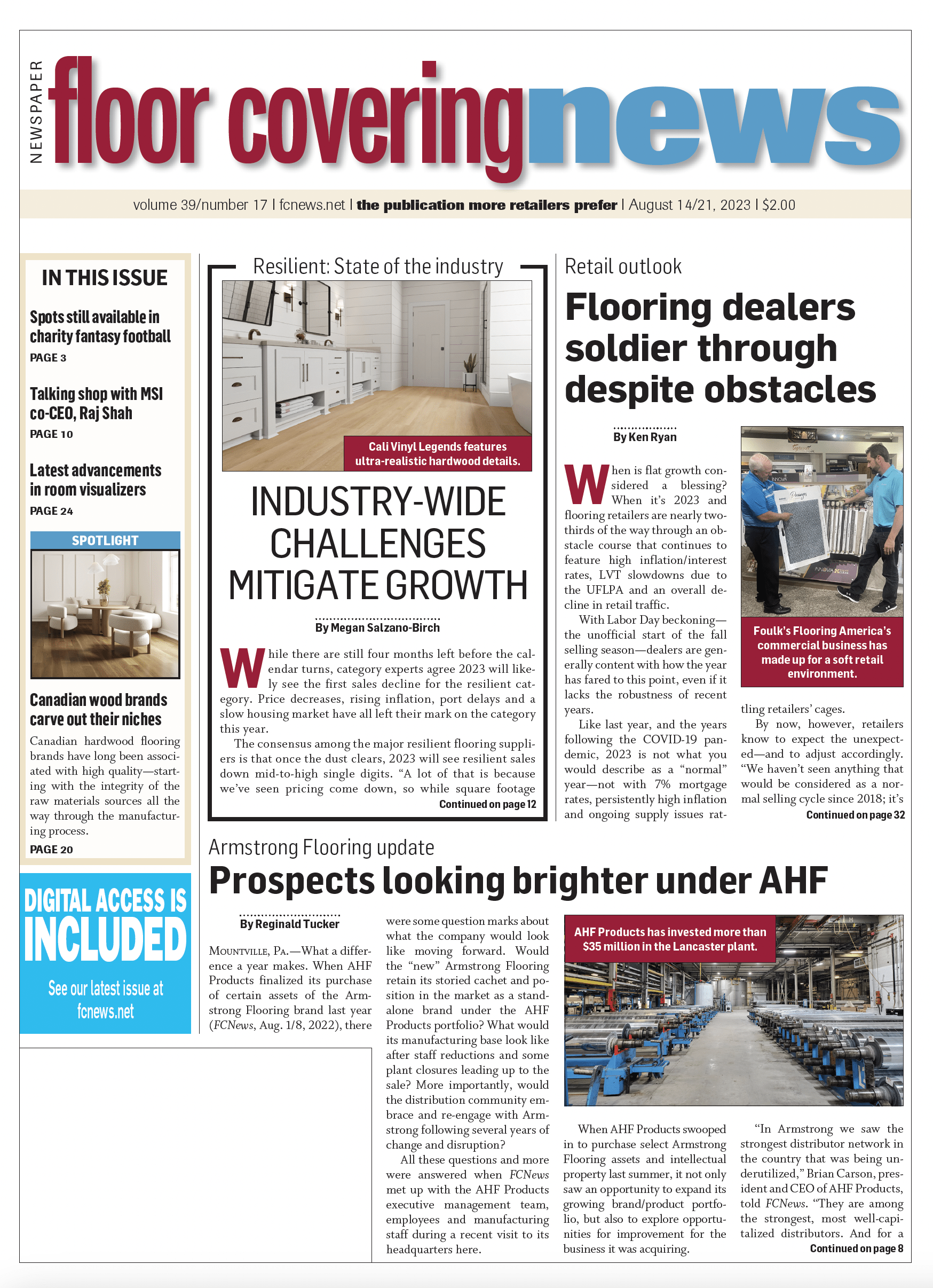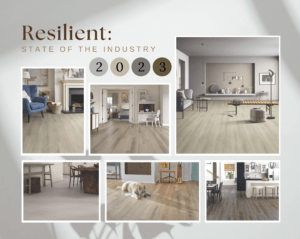 While there are still four months left before the calendar turns, category experts agree 2023 will likely see the first resilient sales decline for the category. Price decreases, rising inflation, port delays and a slow housing market have all left their mark on the category this year.
While there are still four months left before the calendar turns, category experts agree 2023 will likely see the first resilient sales decline for the category. Price decreases, rising inflation, port delays and a slow housing market have all left their mark on the category this year.
The consensus among the major resilient flooring suppliers is that once the dust clears, 2023 will see resilient sales down mid-to-high single digits. “A lot of that is because we’ve seen pricing come down, so while square footage may not be off for some, the dollar value’s coming down—you actually got a lower number year over year,” explained Adam Ward, vice president of product management, resilient, Mohawk. “Retail prices and costs have come down—we’ve seen deflation across the board. It’s likely that they’re still above 2019 levels for a lot of products but we could continue to see deflation depending on what happens with the economy.”
In fact, FCNews’ Statistical issue showed just how important price increases were to the flooring industry in 2022. Within the resilient category itself, Floor Covering News research found resilient generated $9.522 billion in sales in 2022, a 13% increase over 2021’s $8.426 billion. In terms of volume, the category saw just a 4.7% increase to 6.156 billion square feet. The discrepancy in double-digit sales growth vs. a single-digit volume increase is attributed to the unprecedented price increases in freight and raw materials as well as inflationary pressures in 2022 due to the lingering effects of the pandemic. This was true across the board for all categories, including ceramic, which ultimately experienced the most obvious reliance on price increases with a decline in volume and increase in sales for 2022.
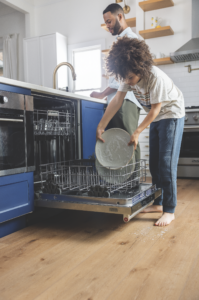
Therefore, it stands to reason that price decreases would damper overall sales and cause the category’s first decrease in its history. Suppliers also point to several other conditions causing the slowdown. “What we attribute it to is really just the macroeconomic conditions that are in play,” said Jeff Francis, director of category management, hard surface, Shaw. “It’s not just specific to hard surfaces or soft surfaces. It’s consumer sentiment, certainly high interest rates.”
However, the decline in sales is not only a pandemic-related effect but something that’s been expected to occur for some time now. In fact, eight months into 2023 and suppliers agree that the much-anticipated plateau to the meteoric rise of the resilient category has taken hold. “We had some years where [resilient experienced] 50% year-over-year growth, which we’ll never see again,” Shaw’s Francis said. “But we knew that slope would eventually have to correct itself. We believe that that’s happened over the past two years. All this [market share] that resilient has taken from carpet, maybe that’s now at an equilibrium for the next three to five years. I believe, until the next innovation comes around, resilient may be saying, ‘Hey, we’re going to take our share and maintain this for a couple of years.’”
There are some bright spots that have helped drive resilient sales this year and will continue to push the category forward into 2024, namely the builder and commercial segments. “It’s a tale of two stories,” explained Yon Hinkle, vice president – resilient products, AHF Products. “There are definitely parts of the business—independent retail and residential overall—that are down. But builder is still performing better than expected—and while it’s probably off its peak, it hasn’t stepped back nearly as much as we expected it to, which is good. And the multi-family segment is still very strong. Companies that are heavy in multi-family or pretty strong in the commercial space are probably doing really well. If you’re very heavily weighted in either big box or independent retail overall, you’re probably down.”
Shaw’s Francis agreed that certain segments of the market are poised to prosper. “The national builders are very bullish,” he said. “As a matter of fact, they’re saying Q4 is going to see a 10% to 15% increase over last year. We’re ramping up service to supply that, which to us is a good leading indicator for the rest of the market.”
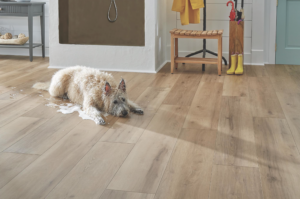
Several major suppliers are even bullish on the rest of the year overall. “We all knew things would come down after [the pandemic],” Mohawk’s Ward said. “This is probably what I classify as a fairly soft landing, and we expect things to improve as we go through the second half.”
Bill Blackstock, CEO of the Resilient Floor Covering Institute (RFCI) agreed, noting, “As we look at the years to come, the combination of a rebounding economy with continued share growth in residential and commercial will produce a bright future for the product category.”
UFLPA creates challenges
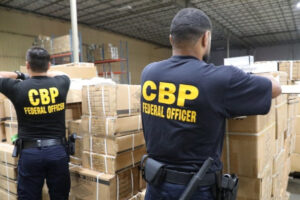 The resilient category, while the largest and fastest growing segment in the industry, is not immune to its fair share of challenges. The most impactful—and certainly most talked about—is the one emanating from the Uyghur Forced Labor Protection Act (UFLPA), which was passed into law by the U.S. government in 2022. UFLPA prohibits the importation of all goods that are produced in or contain any content from the Uyghur region in China—an area believed to house forced labor operations and is a major supplier of PVC and raw materials to China and the greater Asian region.
The resilient category, while the largest and fastest growing segment in the industry, is not immune to its fair share of challenges. The most impactful—and certainly most talked about—is the one emanating from the Uyghur Forced Labor Protection Act (UFLPA), which was passed into law by the U.S. government in 2022. UFLPA prohibits the importation of all goods that are produced in or contain any content from the Uyghur region in China—an area believed to house forced labor operations and is a major supplier of PVC and raw materials to China and the greater Asian region.
To enforce UFLPA, U.S. Customs and Border Patrol (CBP) detained—and continues to withhold—all imported LVT that could potentially contain materials subject to UFLPA restrictions, and is only releasing held shipments after clear and convincing evidence has been produced and confirmed that there is no violation of UFLPA.
The resilient category relies heavily on imports and continues to struggle with the detentions. “It’s resonating in different ways,” AHF’s Hinkle said. “One is just the awareness of how important understanding your supply chain is and having those details buttoned up—which is not easy to do. There’s a lot of work involved but that importance can’t be understated. From a company-to-company basis, some companies have been much more impacted than others. We’ve heard about competitors that have had really significant port stoppages or seizures, they’re just sitting there for months on end or they’ve even been returned.”
Raj Shah, co-CEO, MSI, agreed, noting the impact it has had on suppliers. “The UFLPA has had a profound impact on the industry, with thousands of containers seized at the port, causing massive supply disruptions for the companies involved. We believe UFLPA is here to stay for the long term, and we support the spirit of what the act strives to promote: responsible sourcing and respect for human rights.”
Suppliers across the board have begun to share their strategies for creating better transparency within their supply chains while also supporting their retail partners who are experiencing product shortages due to the detentions. “MSI not only has one of the most comprehensive UFLPA tracing documents in the industry to shield against detentions, we also offer one of the most diversified production capabilities that further shield our dealers from potential disruptions,” Shah explained. “We work in conjunction with our retailers to understand their essential products and build a diversified supply chain with this in mind. Finally, we are working with our retail partners on marketing PVC-free products as well.”
Dick Quinlan, vice president of sales and marketing for Wellmade, noted that the company “continues to increase our production of U.S.-made HDPC/SPC vinyl planks. Wellmade’s Made in USA products help our customers continue to receive products needed while eliminating the challenges associated with importing products.”
Noah Fulton, vice president, business strategy, Karndean Designflooring, said the company has not been impacted by UFLPA and supports its overall goal. “We’re proud to support the Uyghur Forced Labor Protection Act. While the UFLPA has caused disruption in the industry, our supply chain is not affected and we continue to operate without shipping delays.”
Tackling shoddy SPC
The meteoric rise of resilient sales —thanks to SPC flooring— over the years brought major gains to the flooring industry, its suppliers and its retailers and distributors. The rigid core segment posted astronomical gains for years, beating out every other flooring category in terms of growth.
The flip side of this stellar growth, however, was the rapid entry of all manner of players into the category. At the retail level, what was once hailed as a “waterproof” sensation took a hit where it hurts—its durability—as inferior product lines began to experience failures in the field.
Suppliers agree there are multiple drivers behind the failures; however, overall, it’s thinner, lower-quality SPC products that have given SPC a bad name—or at least left dealers with a bad taste in their mouths. “Really, it’s very simple, it’s physical qualities of the product,” AHF’s Hinkle explained. “You get cheaper two ways: you put less material in it—which makes it thinner—and then you put less of the more expensive ingredients in it—so you get much more brittle. Now you have a thin, brittle product. Then there’s failures and people think, ‘Well, that’s just because SPC doesn’t work.’ That’s not true. Yes, I think it’s causing customers to look at other options and ask different questions. But I think it’s important that people really understand the whys of it.”
For some, the UFLPA and the issues with lower-quality SPC entering the market are two sides of the same coin, highlighting the same unfortunate flaw within the industry: quality standards and transparency. “Shoddy product quality and shoddy sourcing compliance (e.g. UFLPA) go hand in hand,” MSI’s Shah said. “Without rigorous audits, management and QC controls in place, it is easy to be burned by shoddy SPC products. In a way, UFLPA enforcement helps weed out these low-quality, low-compliance products from muddying the reputation of the industry.”
Some suppliers say there will always be shoddy products in any consumer category; the trick is educating retailers on the value of proven brand reputations and stringent quality controls. “Retailers simply must be equipped with the knowledge to distinguish the good from the bad and deliver that message to end consumers,” said Alyssa Cole, senior content marketing manager, Novalis. “We deliver a quality product that we have 35 years of experience in manufacturing. We are among the most transparent brands in the business, bringing customers in-house on a regular basis not only to show them how we manufacture products, but also to disclose raw materials. That information travels all the way to end consumers and has increased consumer confidence in our brand and business.”
One interesting side effect of this challenge to SPC has been the growth in laminate flooring. While the small market share laminate has grabbed from resilient is more meaningful to the laminate category than it is destructive to resilient, the phenomenon is interesting. What’s more, suppliers are now focusing innovation on a new kind of laminate flooring product.
“Laminate is an interesting growth story in the flooring industry,” MSI’s Shah said. “The real hero story of laminate is the next-generation technology that laminate gave birth to: hybrid rigid core. While entirely different in composition and product performance, hybrid rigid core has its fundamental basis on the principles of laminate manufacturing. The end result is a completely waterproof solution, with the best scratch resistance in the worry-proof flooring industry, with extremely durable click strength and longevity. It truly is the flooring of the future.”
Sheets remains viable
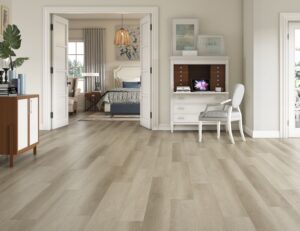
Vinyl sheet has been on somewhat of a wild ride over the last year. Commercial sheet saw a respectable 8% increase in dollar sales to $244 million in 2022. While suppliers don’t expect that kind of growth to continue, the sub-segment shows promise.
“It’s hanging in there,” said David Sheehan, VP, residential hard surface, Mannington Mills. “Obviously, in ’22 and ‘21, you actually saw some growth in that category just because there was such high demand. In some cases, people didn’t have access to the preferred category product—LVT—so they accepted substitutions and, as a result, you saw an increase in sheet. In 2023, it’s kind of holding its own in the market, but we’re not seeing that increased post-COVID-19 demand.”
For AHF, acquiring Armstrong gave it greater resources in the sheet category and the company sees potential for the sub-segment moving forward. “Residential sheet has experienced a slight uptick in the awareness,” Hinkle said. “Part of that because so much of it is domestic, so it didn’t have the same supply issues that other categories had—and from a value standpoint, it’s a great option. I think next year I would expect double-digit growth.”
Domestic manufacturing grows
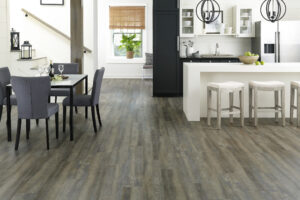
While the resilient flooring category relies heavily on imports, several flooring suppliers have increased their investments in domestic manufacturing of products like SPC, LVT and even sheet in the U.S.
Case in point is AHF Products, which has one of the most robust domestic production operations of any supplier in the industry. The company currently has seven facilities located in Beverly, W. Va.; Somerset, Ky.; Oneida and Only, Tenn.; Warren, Ark.; West Plains, Mo.; and Titusville, Pa. With the acquisition of Armstrong, AHF gained domestic production of sheet products, VCT products, residential tile products and LVT products. “In one fell swoop, we added a significant amount of domestic production, which is obviously very attractive,” Hinkle said. “So, the capabilities that have been added have been across the board in resilient, and AHF is always evaluating the next opportunity. AHF is a company that’s clearly on a growth trajectory—we’re looking for opportunities to continue to expand our business, and with that the potential for domestic type production is always there.”
Mohawk also has domestic production across several product categories, including resilient. “We are doing some additional investment in our Dalton plant, not just for rigid core but for sheet as well—and we’ve completed our Mexicali plant,” Ward noted. “We continue to invest in that domestic production as central to Mohawk’s core beliefs and strategy.”
Shaw has continually invested in its facility in Ringgold, Ga., which manufactures multiple vinyl constructions under one roof. “As a matter of fact, we’ve got an expansion project that’s going to hit coming in 2025,” Francis noted. “We’re going to invest in capacity; we see that as viable long term. What that gives Shaw is a chance to be faster with innovation. We also learn a lot about the overall product and platform that we can use to help our partners. We can share some of that learning as we continue to improve and add new equipment and new functionality.”
Wellmade continues to increase its production of U.S.-made HDPC/SPC vinyl at its plant in Cartersville, Ga. Wellmade’s current annual capacity is 100-120 million square feet per year. “We’re adding additional equipment to raise capacity to over 200 million square feet per year,” Quinlan said. “Currently, Wellmade is producing 48%-50% of all made-in-USA HDPC/SPC vinyl plank flooring. We are the largest U.S. producer of SPC plank flooring.”
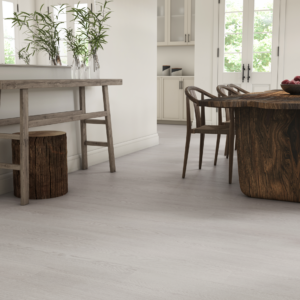
Several other brands have invested in domestic production over the years, including Novalis, which opened its manufacturing plant in Dalton in 2020. “Our decision to open manufacturing in Dalton was reflective of the journey of our brand and our commitment to be closely connected to our customers,” Cole said. “This location enables us to better service our customers while also helping to grow and support a community rich in the history of flooring manufacturing. The production facility highlights the most advanced technologies in rigid core LVT manufacturing and houses the latest in automation.”
Nox Corporation, one of the largest global LVT manufacturers, is in the unique position of having its U.S. manufacturing facility in the center of the country—Fostoria, Ohio, to be exact. This provides it with the advantage of more easily servicing both its West and East Coast customers.

